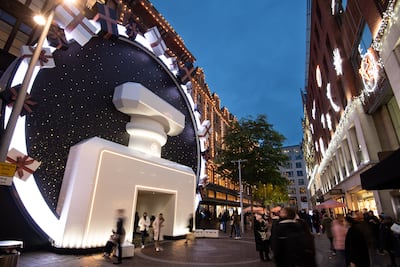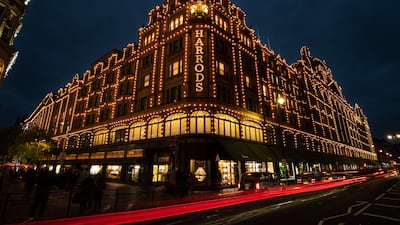Omicron: Live updates on the spread of the variant
Harrods, the luxury department store in Knightsbridge, London, has brought forward its post-Christmas sale by 10 days amid growing business uncertainty caused by the Omicron Covid-19 variant.
The retailer said items will be marked down from Friday “in response to ongoing trading realities”. Further reductions will be added on Boxing Day, when the sale usually starts each year.
The move comes as shops across the UK report a drop in the number of shoppers coming through their doors and pubs and restaurants report being hit by cancellations.
The rapid spread of the Omicron variant has forced many people into self-isolation, or to reduce mixing to avoid falling ill before Christmas, and forced some business to close because of a lack of staff.
Harrods said the well-being of customers and colleagues was its “top priority” and “the highest standards of safety measures will be in place around the store”.
“As we enter this important moment in the trading calendar, we are delighted to give our customers the festive treat of the Harrods winter sale to enjoy wherever they are, be that at our iconic Knightsbridge store, online or through our remote shopping services,” Harrods managing director Michael Ward said.
“Harrods has never been afraid of adapting to suit the changing needs of our customers, and we hope that bringing our sale forward will give our clients all over the world an opportunity to enjoy the magic of Harrods at Christmas for longer.”
Trade body UK Hospitality’s boss Kate Nicholls has made a plea for business rates relief and VAT discounts to be extended, saying that the sector has been knocked harder than expected by the new restrictions.
She said hospitality sales have already plummeted by more than a third over the past 10 days, with trade worth £2 billion ($2.66 billion) lost in December so far.
An estimated three million Christmas bookings have been cancelled in the past week.
On Thursday the UK declared a record-breaking daily Covid total with 88,376 new infections.
Consumer confidence has been knocked by new restrictions and increased, at times confusing, health warnings.
Prime Minister Boris Johnson has told people there is no need to cancel Christmas party plans, but Prof Chris Whitty, England’s chief medical officer, has adopted a more cautious approach to Omicron. He said people should prioritise those they most want to spend time with over the Christmas period and skip other gatherings.
Mr Johnson’s advice to work from home but still go to Christmas parties was ridiculed by hospitality workers.
On Thursday he denied health warnings amounted to a lockdown by stealth, saying: "We are not locking down."
Chancellor Rishi Sunak is said to be drawing up a rescue package for the hospitality sector after restaurateurs reported dwindling numbers of customers. Middle east chain Noura, which has several London restaurants, told The National it had lost up to 80 per cent of its bookings.
Mr Sunak will cut short a work trip to the United States to fly home for crisis talks with industry leaders.
The chancellor said “I appreciate that it is a difficult time for the hospitality industry” and promised that the government would continue to do “whatever it takes” to support lives and livelihoods.
Official figures released on Friday showed UK retail sales picked up pace in November as shoppers splurged on early Christmas shopping and Black Friday deals.
Sales increased by 1.4 per cent for the month, accelerating from an increase of 0.8 percent in October, according to the Office for National Statistics. The reading was better than expected, with analysts having forecast that growth would remain steady at 0.8 percent.

The ONS said sales volumes across the sector were 7.2 per cent higher than pre-pandemic levels from February 2020.
November was boosted by non-food sales in shops, which lifted by 2 per cent for the month. The ONS said sales in clothing shops shot up by 2.9 per cent, surpassing pre-pandemic levels for the first time.
"Retail sales picked up in November, boosted by strong Black Friday and pre-Christmas trading. Clothing stores fared particularly well and have exceeded their pre-pandemic level for the first time," ONS statistician Heather Bovill said.
Currys, the electrical retailer, said its market had softened in recent weeks while online fashion retailer Boohoo said its annual profits and sales this year would probably suffer from customers returning smart clothing. Office workers spent months working from home during the pandemic, causing the demand for business attire to plummet.
Previous data from the British Retail Consortium showed a 5 per cent rise in retail spending last month as shoppers snapped up Black Friday discounts – many of which were offered earlier in the month than in previous years.
The government’s package of Plan B measures, which included mandatory face masks in most indoor public settings, working from home and vaccine certificates in night clubs, has compounded the public’s fears of Omicron and added to the ongoing uncertainty.











